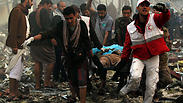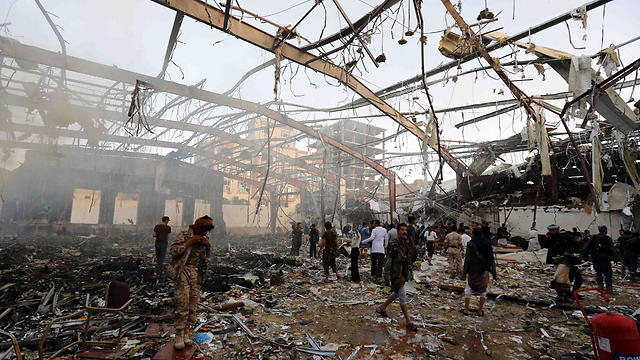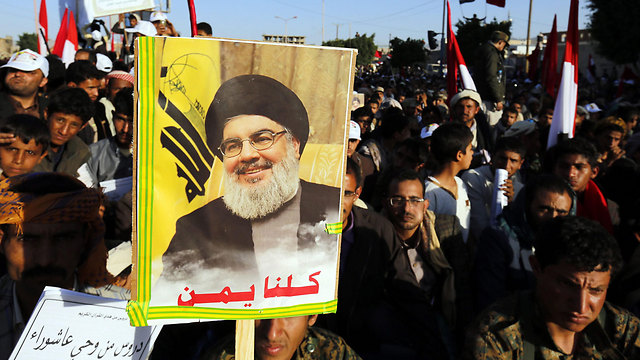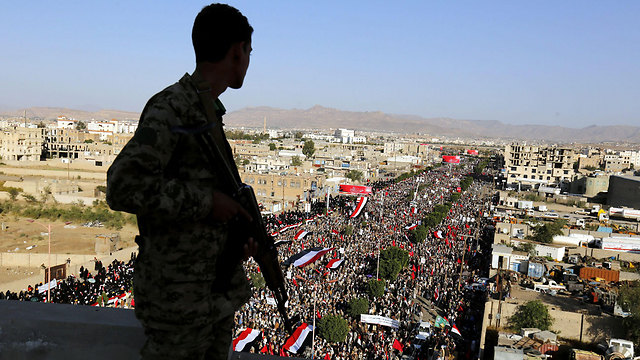

Saudi-led coalition blames Yemeni intelligence failure in funeral bombing
Following a bombing which killed 140 people at a funeral hall in Yemen, the Saudi-led coalition has taken responsibility for the tragedy, citing an intelligence failure; investigators are reviewing the incident; US reviewing military aid to Saudi Arabia in light of the strike.
CAIRO- A Saudi-led coalition on Saturday blamed "wrong information" for the bombing last weekend of a packed funeral hall in the rebel-held Yemeni capital that killed at least 140 people and wounded some 600.
The coalition's Joint Incidents Assessment Team, or JIAT, said a "party" affiliated to Yemen's General Chief of Staff headquarters had provided intelligence that the hall in Sanaa was filled with leaders of the Shiite Houthi rebels, whom the coalition has been targeting since March 2015, when it intervened in Yemen's civil war in support of the internationally recognized government.
The unidentified party insisted the site was "a legitimate military target," the English-language statement said. The Air Operation Center in Yemen, it added, directed a "close air support mission" to target the site without approval from the coalition's command.
The investigators called on the coalition to immediately review the rules of engagement and recommended that compensation be offered to the victims' families.
"JIAT has found that because of non-compliance with Coalition rules of engagement and procedures, and the issuing of incorrect information, a Coalition aircraft wrongly targeted the location, resulting in civilian deaths and injuries," it said.
The coalition, which had initially denied any responsibility, said it accepts the results of the investigation and has started to implement the recommended changes. "The coalition command expresses its regret at this unintentional incident and the ensuing pain for victims' families," it said in a statement.
The Yemeni government of President Abed Rabbo Mansour Hadi has yet to publicly comment on the Oct. 8 bombing.
Yemen's chief of staff is Maj. Gen. Mohammed Ali al-Maqdishi, a close ally of the powerful army general Ali Mohsen al-Ahmar, now serving as vice president. Al-Ahmar is also a top ally of Yemen's Muslim Brotherhood, which is fighting the Houthis alongside government troops.
The US-backed coalition, which views the Houthis as an Iranian proxy, has come under mounting pressure to investigate the bombing. Human Rights Watch said in a report Thursday that the bombing constitutes an apparent war crime and said remnants of a US-made bomb were found at the site of the strike.
Along with arms, the United States provides the coalition with logistical support and midair refueling of warplanes. The White House has said it will immediately review its assistance to the Saudi-led coalition, explaining that such assistance was not a "blank check."
The bombing of the funeral hall was not the first by the coalition to cause civilian casualties. Over the past year, coalition warplanes have bombed busy markets, weddings, schools and hospitals, killing hundreds of people and wounding thousands.
The deadly airstrikes on the funeral triggered a wave of counterattacks against both US and Saudi targets.
A US Navy destroyer deployed in international waters in the Red Sea off the coast of Yemen came under attack twice in recent days from areas under Houthi control. In response, the US destroyed three radar installations in Houthi-controlled ports near the Bab al-Mandab strait on Thursday, in the first direct US involvement in Yemen's war.
The Houthis denied firing at the destroyer and accused the US of using the attack as a justification to become more directly involved in the civil war.
Houthis and allied army units loyal to ousted President Ali Abdullah Saleh have also fired rockets and missiles at Saudi military installations and air bases across the Yemen-Saudi border.
On the diplomatic and political level, the bombing intensified pressure on the Saudi-led coalition. The coalition had forced the closure of Sanaa international airport for the past two months, after the collapse of peace talks between rival parties in Kuwait.
However, a Houthi official said Saturday that the coalition has agreed to open the airport to allow a team of peace negotiators sent by Houthis and allies from Saleh's onetime ruling party to return to the country. The negotiators have been stuck in Oman for two months after leaving Kuwait.
Meanwhile, more than 100 people who were wounded in the funeral hall bombing have been allowed medical evacuation to seek treatment outside of Yemen, a government official said.
Houthi and government officials spoke on condition of anonymity because they were not authorized to speak to the press.
The Saudi-led coalition has imposed a blockade on Yemen since the start of the war.


















